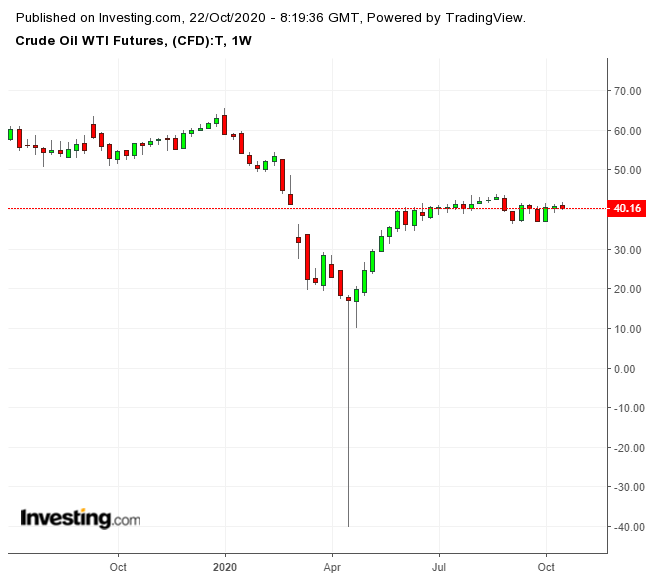Investing.com’s stocks of the week
For four months, the oil market has essentially stood still, waiting for news about whether the coronavirus is going to get better or worse, whether government lockdowns will end or become more stringent, and, most importantly, whether the global economy is recovering—or not.

The upcoming U.S. Presidential election is also adding to the uncertainty markets are dealing with.
Now that the Nov. 3 election is less than two weeks away, let’s look at how short-term oil prices are likely to react under different election scenarios:
1. A President Trump Re-election
If President Trump wins re-election, and we learn the result on the evening of Nov. 3 or early morning of Nov. 4, this will be seen as a positive sign for the economy, as Trump opposes economic shutdowns and supports less regulation and lower taxes. He also presided over a period of economic growth during his first term.
A second Trump term would continue the status quo with high levels of U.S. production and sanctions on Venezuela and Iran, but these policies are unlikely to drive the market immediately following the election. Rather, news of a Trump victory would indicate to the market that increased demand is likely to follow shortly. Traders would likely view this news as a positive sign for oil prices in the weeks following the election.
2. A Vice President Biden Victory
If Vice President Biden is announced as the winner in the evening of Nov. 3 or early morning of Nov. 4, this clarity will also be seen as a positive short-term sign for the economy. Even though we know less about what a Biden Presidency would mean for the economy, a Biden win would end the uncertainty over the election and calm investors and traders.
In the long run, a Biden presidency could mean higher oil prices because he is much more hesitant to support domestic U.S. oil and gas production. He is also likely to end the sanctions against Venezuela and Iran that have reduced—though not ended—oil exports from these countries. However, Biden’s energy policies aren’t what will drive short-term contracts in the first two weeks of November. A clear election result would likely be enough to have a positive effect on prices short term.
3. An Unclear Winner
If on the night of Nov. 3 and the day of Nov. 4 no clear winner is announced, it is possible that we won’t know who will win the presidential election for several weeks, as happened most recently in 2000.
This year, larger than normal numbers of voters are submitting absentee and mail-in ballots, which in some states can take days or weeks to count. Moreover, because of the tightly contested race and the expected claims of irregularities, the United States is bracing for potential legal battles over the outcome of the election. (In 2000, multiple recounts of Florida and legal challenges meant that the winner of the election was not known until late November).
If the result of the election remains unknown before Americans wake up on Nov. 4, the uncertainty could cause serious volatility in financial markets. In this case, the fear of economic problems would likely prevail.
There is no specific reason why uncertainty over the winner of the election would cause a drop in oil demand other than a brief negative impact on the overall economy, but the wait for a result will have a negative impact on financial and commodity markets. Everyone involved in markets will be nervous about a nightmare scenario. That potential remains real.
